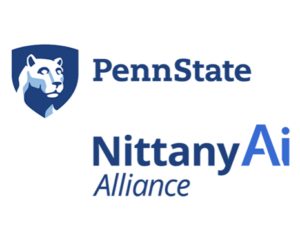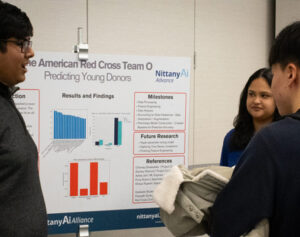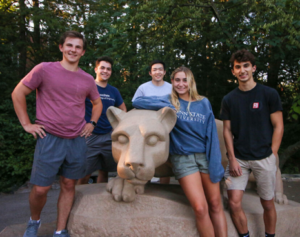 When innovation thought leader and tech futurist Daren Coudriet first realized Artificial Intelligence’s (AI) potential, he knew it would be a game changer – in education, in business, and in the way that employers and employees approached their operations. And at the first-ever PA Chamber AI Summit on Tuesday, December 10, Coudriet, who co-founded and leads the Nittany AI Alliance – an organization that teams with industry partners to engage students on AI solutions, services, and outreach projects – will highlight how business leaders can make this future-forward technology work for them.
When innovation thought leader and tech futurist Daren Coudriet first realized Artificial Intelligence’s (AI) potential, he knew it would be a game changer – in education, in business, and in the way that employers and employees approached their operations. And at the first-ever PA Chamber AI Summit on Tuesday, December 10, Coudriet, who co-founded and leads the Nittany AI Alliance – an organization that teams with industry partners to engage students on AI solutions, services, and outreach projects – will highlight how business leaders can make this future-forward technology work for them.
A key theme of Coudriet’s message will be dispelling the myth that AI will replace jobs. Rather, Coudriet argues, “AI won’t replace workers—workers who understand AI will replace those who do not.” His message to businesses: The competitive edge will lie in embracing AI as a tool to augment employee capabilities, not diminish them. In that sense, AI could stand for “Augmented Intelligence,” because people will employ it to more effectively and efficiently do their jobs.
Coudriet knows that AI is here to stay and has forever changed business as we know it. And, as the technology is poised to impact industries worldwide, Coudriet’s insights will explore how Pennsylvania businesses can harness this transformative technology to enhance their operations, retain talent, and develop their workforce.
Practical AI Applications: Solutions That Work
Coudriet will teach business leaders more about embracing the practical applications of AI, drawing from the successes of the Nittany AI Alliance. Offering hands-on business experiences to students and helping solve real-world employer problems, the Alliance has focused on helping nonprofits and government agencies. The goal of these projects, with entities like the Southeastern Pennsylvania Transportation Authority (SEPTA) and Goodwill Industries, have been to demonstrate how the technology could be used to improve operations and service. With SEPTA, the student team used AI to analyze footage from subway cameras to identify potential safety issues. Coudriet envisions the Nittany AI Alliance and additional collaborations, like public-private partnerships, playing a key role in advancing similar initiatives across Pennsylvania’s top industries for economic growth, along with new AI-centric industries.
Building Pennsylvania’s Innovation Ecosystem
Coudriet will also discuss the opportunity of growing an “innovation ecosystem” in Pennsylvania, one that unites industry, higher education, and government to drive economic development and reduce brain drain. “We need to work together to keep the next generation of talented workers here in the Commonwealth,” he said – drawing on a common economic theme from the PA Chamber.
economic development and reduce brain drain. “We need to work together to keep the next generation of talented workers here in the Commonwealth,” he said – drawing on a common economic theme from the PA Chamber.
Looking ahead, Coudriet sees limitless opportunities for AI as Pennsylvania takes a leadership role. For example, Governor Shapiro’s partnership with OpenAI and $10M Agricultural Innovation Grant Program, the first of its kind in the nation, will provide a combination of technology and funding for the application of artificial intelligence, enabling innovation. Within the agriculture field, the Nittany AI Alliance is currently conducting a pilot project that is focused on better understanding crop damage caused by deer. Using computer vision and machine learning algorithms, their team is collecting data to better quantify the cost of deer damage to crops. Both the state of Pennsylvania and Penn State, having significant backgrounds and resources in the agricultural sector, will benefit greatly from AI-driven innovation — launching new initiatives that harness Pennsylvania’s unique agricultural strengths through collaborative innovation.
Staying Competitive with Other States
As other states, like Florida, make strides in AI, Coudriet emphasizes the importance of Pennsylvania maintaining its competitive edge. “The Nittany AI Alliance is focused on empowering business owners, nonprofits and public agencies, helping them see how AI can make their operations smarter and more efficient,” he noted. “AI is not something to run from—it’s a technology we need to embrace.”
 AI, Workforce Development, and the Path Forward
AI, Workforce Development, and the Path Forward
The rapid evolution of Generative AI (GenAI) tools like ChatGPT—leveraging deep learning to generate and understand content—demonstrates how transformative the technology has become. Coudriet suggests that organizations explore how AI can enhance their workforce. For example, customer service bots, such as “Erica” at Bank of America, provide personalized, efficient service, showcasing the power of AI to complement human employees. This same customer service model can be applied to most of the business and government agencies across the state.
Workforce development is also a critical area of focus in AI. “Penn State, the single land-grant university in the state, wants to help businesses integrate AI into workforce development strategies—both to introduce students to AI tools and to help current workers develop new skills,” Coudriet explained. The ultimate goal: retain skilled graduates in Pennsylvania and build a sustainable, future-ready economy.
With his insights at the PA Chamber’s AI Summit, Daren Coudriet will underscore the need for businesses, educators, and government to align their efforts around AI. As he puts it, “The sky is the limit if we leverage AI the right way. Together, we can shape the future of Pennsylvania.”
Don’t miss this and other engaging AI-centric discussions at the PA Chamber’s inaugural AI Summit on December 10, 2024! Register today.